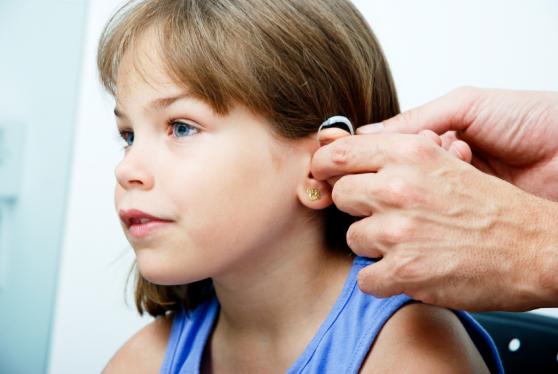
The first and from a rehabilitative point of view most important contact for a D/HH child’s family is the local hearing centre or equivalent unit. The hearing rehabilitation of small children is usually concentrated at university hospitals, but some central hospitals host pediatric rehabilitation work groups.
The rehabilitation offered by a hospital is largely medical by nature, i.e. a multidisciplinary team takes charge of the child’s hearing rehabilitation and related speech development. Rehabilitation is planned based on each child’s unique circumstances and needs, and the process will involve cooperation with other hospital units, if necessary. These may include pediatric neurology, ophthalmology, medical genetics, etc.
After the D/HH diagnosis has been confirmed, the family will receive information about hearing and its rehabilitation. Rehabilitative goals are formulated in cooperation with the family. Based on rehabilitative needs, the hearing centre’s followups are more frequent and with time they become annual checkup visits. Depending on the hospital, the monitoring may continue until the child is of age or enters higher education, which transfers his case to the adult side and visits are arranged based on need.
The staff composition at a hearing centre varies from hospital to hospital, but a rehabilitation team may include the following professionals:
An audiologist is a doctor familiar with hearing rehabilitation. He or she evaluates what sort of hearing tests the child needs, interprets the results and produces the diagnosis for hearing impairment, if necessary. The audiologist starts the rehabilitation process and, depending on what decisions are made, is responsible for evaluating the need for hearing aids or other assisitive devices or the activation and adjustment of a cochlear implant, together with the technical staff. The audiologist bears the overall responsibility for the implementation and followup of the rehabilitation plan.
An audiometric technician performs the necessary hearing tests, guides the parents in the use of hearing aids, cochlear implants and assisitive devices and monitors the childs hearing behavior as it relates to the results from the hearing tests.
A speech therapist evaluates and monitors the development of the child’s hearing and language, assesses the need for speech therapy and provides or arranges for said therapy. He or she guides the parents and, if necessary, the speech therapis in the child’s linguistic development.
A rehabilitation counselor supports the parents in matters related to parenting and education, makes sure that the rehabilitation process is successfully integrated into the family’s life, participates in decision-making related to daycare and schooling and directs the staff at daycare and school in the use of hearing-related assistive devices.
A psychologist discusses the family’s expectations for the rehabilitation process and its outcomes. He or she observes the child and evaluates the child’s cognitive and psychological development level, examines the child’s readiness for school and makes a recommendation regarding the type of school the child shoul attend. The psychologist also bears responsibility for the long-term supervision of the child’s overall development.
A social worker reviews the family’s circumstances as a whole, evaluates the family’s resources in the rehabilitation process and, if necessary, refers them to support services. He or she makes sure the family receives all the financial and social support they are entitled to and helps with the application processes when necessary.
The technical staff takes part in the adjustment of hearing aids and cochlear implants and is responsible for the service and repair of assistive devices.
Sources:
Hasan, M. (2010). Puheterapeutti kuulokeskuksessa.Teoksessa Lonka, E., Launonen, K. (toim.). Kuulonkuntoutuksen käytännöt muutoksessa. Helsinki: Palmenia, 22-37.
More information
-
TYKS, Turku area: Kuulokeskus (in Finnish)
-
KYS, Kuopio area: Kuulo- ja tasapainokeskus (in Finnish)
-
TAYS, Tampere area: Kuulokeskus (in Finnish)
-
OYS, Oulu area: Audiofoniatria ja Kuulokeskus (in Finnish)




